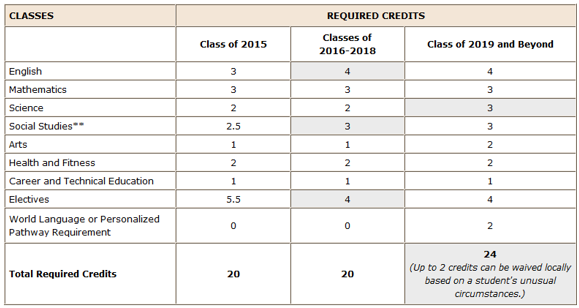Earning a high school diploma is a pivotal step towards shaping one’s future prospects. For students seeking alternative paths to supplement or accelerate their high school education, exploring various credit-obtaining methods is crucial. This comprehensive guide delves into the diverse options available, empowering you to customize your learning journey and achieve your academic aspirations.

Image: creditwalls.blogspot.com
Discovering the Landscape of High School Credit Acquisition
High school credits are units of measurement reflecting the completion of a specific course or subject. The number of credits needed for graduation varies across states and school districts, typically ranging from 20 to 28. Understanding the different ways to earn credits allows you to tailor your educational pathway to suit your unique needs and goals.
Diverse Avenues for Credit Accumulation: Exploring Your Options
-
Traditional Classroom Learning: Enrolling in traditional high school courses at a brick-and-mortar school remains a widely adopted method for earning credits.
-
Online Schools: Online learning platforms offer flexibility and convenience, enabling students to access courses and complete assignments at their own pace and schedule.
-
Independent Study: Working directly with a teacher or an academic advisor, students can independently pursue courses of their interest, often focusing on specific areas of strength or need.
-
Credit Recovery Programs: Designed for students needing to retake courses or make up for missed credits, these programs provide structured opportunities to earn missing credits.
-
Dual Enrollment: This option allows high school students to simultaneously earn high school and college credits by taking courses at a local community college or university.
-
Advanced Placement (AP) and International Baccalaureate (IB) Courses: Rigorous academic programs, AP and IB courses provide students with the opportunity to earn college-level credits while still in high school.
-
Correspondence Courses: Through correspondence, students can complete courses by exchanging assignments and materials with an instructor via mail or online platforms.
-
Military Education: Enlisting in the military offers opportunities for educational advancement, including the chance to earn high school credits and even pursue higher education.
-
Community Involvement: Certain volunteer work or community service activities can be recognized for credit by some schools, fostering civic engagement and real-world learning.
-
Work-Based Learning Programs: Combining classroom learning with practical work experience, these programs provide students with opportunities to earn credits while gaining valuable workplace skills.
-
College Level Examination Program (CLEP): Students can demonstrate their mastery of college-level material by taking CLEP exams, potentially earning college credits without taking college courses.
-
GED Examination: For those who have not completed high school, the GED exam provides an opportunity to earn a high school equivalency diploma, opening doors to further education and career advancement.
Tailoring Your Credit Acquisition Strategy: Navigating the Maze of Options
The plethora of credit-obtaining methods empowers you to customize your learning journey based on your individual circumstances and aspirations. Carefully consider your strengths, areas for improvement, and future plans when selecting the most suitable options for you. Explore the various programs offered by your school or community and research any potential additional costs or prerequisites. Seek guidance from counselors or advisors to optimize your credit-earning strategy and ensure alignment with your long-term goals.

Image: www.conqueryourexam.com
How To Get High School Credits
Embark on a Lifelong Learning Journey: The Enduring Value of Education
Acquiring a high school diploma is not merely a means to an end but an investment in your future. It signifies your dedication to learning, perseverance, and the pursuit of knowledge. The skills and knowledge gained through high school education provide a solid foundation for success in higher education, career endeavors, and personal growth. Embrace the opportunity to shape your educational path, maximize your potential, and unlock a world of possibilities. Let the acquisition of high school credits be the first step in your lifelong learning journey.